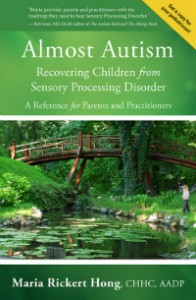 Here’s how I finally got help for Sensory Processing Disorder.
Here’s how I finally got help for Sensory Processing Disorder.
For my older son, I had a litany of signs for 3-1/2 years that told me something was wrong, despite reassurances to the contrary of his doctors.
The Tipping Point
It all hit the fan when our nanny left to have her own baby shortly after my oldest son turned 3. Yes, I was extremely fortunate to be a stay-at-home mom with a nanny; but, looking back, I really needed the help.
My older son had been used to having either me or the nanny completely to himself. All of a sudden when she left, he was forced to share me with his baby brother. So what did he do?
He cried. And cried. And cried. And cried. And cried. Over EVERY little thing. 
The only relief I got from his clinginess and neediness was when he started preschool for a few hours a week shortly after the nanny left.
Although at home he was either a chatterbox or a non-stop crier, at preschool, he kept to himself and rarely said anything. He was so quiet his teachers thought he might have a speech problem, which he definitely didn’t.
Of course, once he came home, he let all of his frustration and anxiety out, as kids do, but I began to sense that the amount of his crying was far greater than that of his peers.
He was frustrated. I was frustrated. I wasn’t getting any definitive answers from anyone or anywhere.
By now, we had seen a few different pediatricians, an allergist, a gastroenterologist, and even had an assessment performed by a Birth to Three agency; and all of them said the same thing: nothing was wrong with my son. But I knew there was; I just couldn’t put my finger on it. A mother knows!
I didn’t know whom to turn to for help. Help! A few months after my older son started preschool, his teachers alerted me that he cried and cried all the time one day while he was at school.
It Was a Dark and Rainy Day…
It was a very dark and rainy day, and apparently my son thought that it was nighttime and that I had neglected to pick him up, which wasn’t the case. Finally, I had something more definitive and concrete to go on.
I wanted to rule out any kind of physical problem, so I took him to the pediatrician. (By this time, I had switched to a doctor that wasn’t dismissive and condescending.) It turns out that my son had an ear infection.
Still, I thought his reaction was excessive, and I told her so and reminded her of some of the other things I thought were unusual, such as the fact that he didn’t walk until he was 20 months old.
Although she couldn’t come up with a diagnosis, she referred me to a psychiatric nurse practitioner that specializes in children’s behavioral problems, who then referred me to an occupational therapist (OT).
Before we began working with the OT, she had me fill out a sensory profile and a sensory questionnaire. Here are some of my comments from the profile and questionnaire:
- Is “very good at hiding pain; past 2 ear infections were within the past 4 months, and he never complained about the pain”.
- Can be “stubborn or uncooperative when asked to do something physically”.
- “Intent on controlling/manipulating to keep environment predictable: a little dictator.”
- “Often very inactive, unmoving or lethargic.”
- “Seems to require too much sleep at odd times. Took 2 naps a day up until 18 months of age; can still take 3 hour naps at times.”
- “Difficulty walking up/down flights of stairs: doesn’t alternate feet.”
- “Unusual toilet habits: refuses to potty train.”
- “Maintains rigid and repetitive patterns or ‘rules’; extremely long, involved and rigid bedtime routine.”
- “Avoids age-appropriate participation in group gross-motor activities.”
- “Cannot lift heavy objects, avoids heavy work.”
- “Resists new physical challenges; says ‘I can’t’ without attempting. Even says ‘I can’t’ to things he can do. Is he lazy or tired? We don’t know.”
- “Seems weaker or tires more easily than peers.”
- “Swimming (group) class at 2 years of age was a disaster. He would not pay attention to the instructor because he was too distracted by lights and surroundings. He was so frustrated after a few weeks of going to class that he wiped down half the kitchen one day after class. We never went back.”
- “Gym class was a disaster because he would lie on the floor and suck his fingers for most of the class.”
So guess which one of these comments gave the biggest clue as to what we were dealing with. Give up? It was “cannot lift heavy objects; avoids heavy work.”
The story behind this comment was that my two sons were playing with a heavy glass blender carafe one day on the kitchen floor. My younger son, who is 21 months younger and about a year and a half old at the time, could lift it while my older one could not, despite how hard he tried.
What Is Sensory Processing Disorder?
From my answers, I began to see that my son had pretty severe sensory issues. I began to read everything I could about Sensory Processing Disorder (SPD).
Now at last I began to understand what we were dealing with and that we weren’t alone. Finally.
Also, the reason that no doctor was able to help is that Sensory Processing Disorder is not an official diagnosis recognized by the DSM (“Diagnostic and Statistical Manual of Mental Disorders”), which is a reference book for mental health professionals that lists categories of mental disorders and the criteria for diagnosing them), such as autism or ADHD.
From a doctor’s point of view: no diagnosis, no treatment. Which is why it took so long to get any help.
The bad news is that it took 3-1/2 years to understand that it was Sensory Processing Disorder. That’s 3-1/2 years of valuable time wasted when the brain is growing and developing at a phenomenal rate.
That’s why most states have some kind of birth-to-three program because if you can catch developmental delays before a child turns 3, the child might not miss out on critical brain-development times.
For example, if a child has a speech delay that is not addressed by the time the child is around 3 or even earlier, then the part of the brain that deals with language might not grow properly and some language function may be permanently lost.
The good news is that now we finally had an answer. If you know what you’re dealing with, then you can get help in treating it.
Read more about how my son was recovered from Sensory Processing Disorder in my book, “Almost Autism: Recovering Children from Sensory Processing Disorder, A Reference for Parents and Practitioners”.



